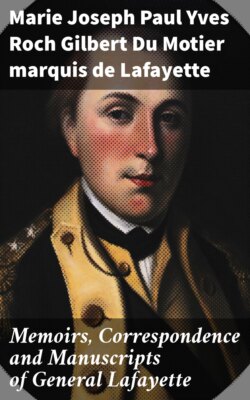Читать книгу Memoirs, Correspondence and Manuscripts of General Lafayette - marquis de Marie Joseph Paul Yves Roch Gilbert Du Motier Lafayette - Страница 16
На сайте Литреса книга снята с продажи.
F. — DISSENSIONS BETWEEN THE FRENCH FLEET AND THE AMERICAN ARMY.
ОглавлениеTable of Contents
The history of Dr. Gordon, that of Ramsay, and of Mr. Marshall, give a detailed account of the arrival of Count d'Estaing at the entrance of the Delaware, his arrival at Sandyhook, and the expedition against Rhode Island. Lafayette conducted thither, from White Plains, two thousand men of the continental troops. He made that journey (two hundred and forty miles) very rapidly, and arrived before the remainder of the troops under Sullivan were in readiness. It is to be lamented that the latter general persuaded Count d'Estaing to await the cooperation of the Americans, whilst, had he encouraged him to force the passage between, Rhode Island and Cannanicut Island, he would have had time, at the first moment of his arrival, to have captured fifteen hundred Hessians who were upon the last-mentioned island. On the other hand, M. d'Estaing was wrong in being displeased with General Sullivan for effecting his passage and taking possession of the forts on the north of the island, as soon as he learnt that they had been abandoned by the enemy, and without having concerted any plan of operations with the admiral. Everything, however, went on extremely well. The Americans had twelve thousand men upon the island; their right was composed of the half of the continentalists brought by Lafayette from White Plains, and of five thousand militia, and was under the command of General Greene; the left consisted also of five thousand militia, with the other half of the continentalists, and was commanded by M. de Lafayette. On the 8th of August the American army proceeded to Howland's ferry, whilst the squadron forced the passage. The English set fire to three of their own frigates; they had six frigates, and several other vessels, burnt during this expedition. In the afternoon of the day that Sullivan's army landed, they were expecting the battalions of Foix and Hainaut, and the marines, which were to have joined Lafayette's corps, when Admiral Howe suddenly hove in sight, and took possession of the anchorage that Count d'Estaing had quitted, in order to force his passage between the islands. The French sailors feared that the enemy, would take advantage of their situation, enclosed as they were between the islands, or that some reinforcements would at least be thrown upon the southern part of the island; but the wind having changed during the night, Count d'Estaing sailed out gallantly through the fire of the English batteries, and Lord Howe, cutting his cables, fled before him. This skilful admiral would have paid dearly for his bold manoeuvre, if the storm had not come most opportunely to his aid.
Mr. Marshall, who had the letters of Washington and Lafayette before him, states the manner in which Lafayette, on the one side, exposed himself, without reserve, to the loss of his popularity, and on the other, zealously exerted himself in defending the honour of the French from the accusations that the dissatisfaction of the Americans had universally excited, especially at Rhode Island and Boston, against the officers of the squadron; and also to prevent that dissatisfaction from breaking into open disputes. Sullivan, the senior of the three majors-general, was commander-in-chief. It was after an explanation with Lafayette, his friend and comrade, that he softened, by a subsequent order of the day, the expressions which he had imprudently used in the one preceding. General Greene, a man of superior merit, contributed much to the reconciliation. The ex-president, Hancock, who had at first loudly expressed his displeasure, consented to repair to Boston to endeavour to calm the public mind, and to obtain provisions for the squadron. The popularity of Lafayette was usefully employed during his short visit to that town. The congress, and General Washington also, thought that this quarrel could not he too speedily appeased; but they were at a distance, and a proper mixture of firmness and persuasion was required from the first moment. Such a perfect understanding, however, was now established, that it was not even disturbed by the unfortunate event which, some time afterwards, cost M. de Saint Sauveur his life. Much was also due to Dr. Cooper, a distinguished minister of the Presbyterian church. (Manuscript No. 2.)
